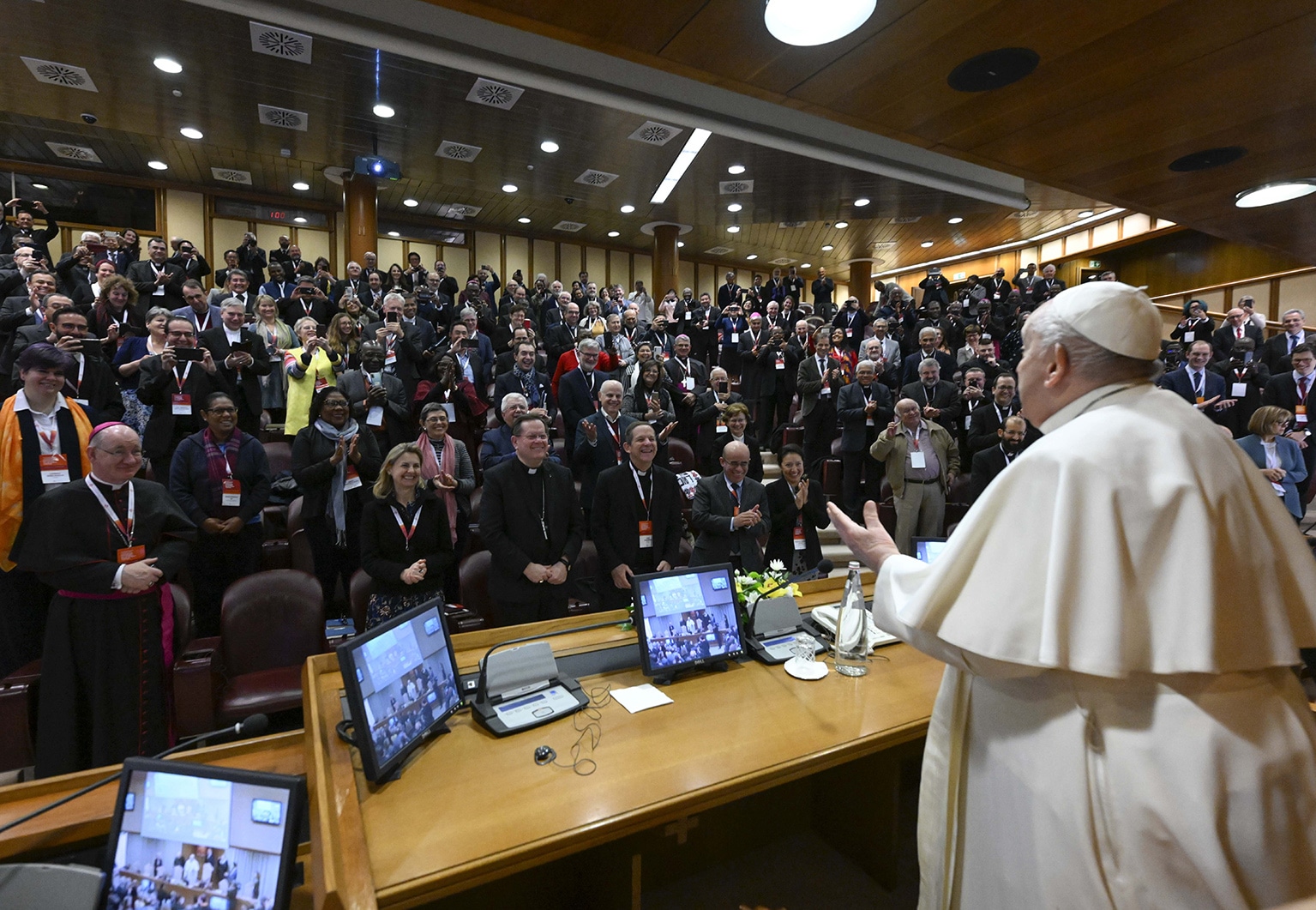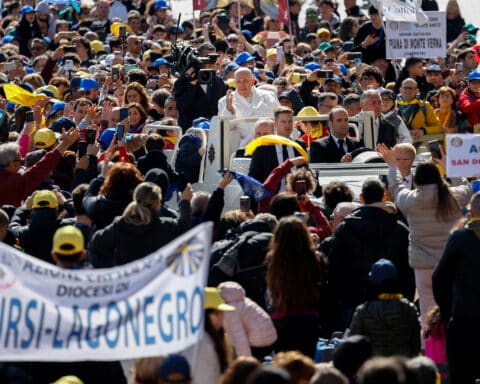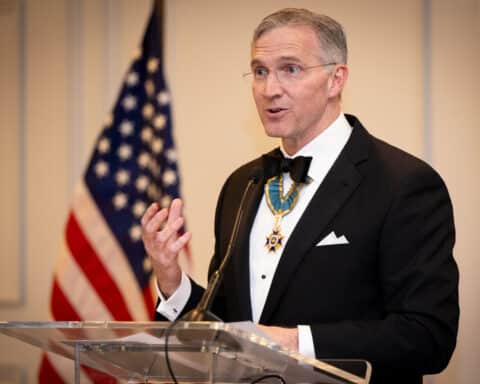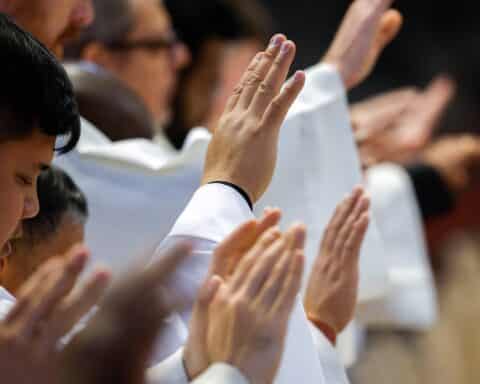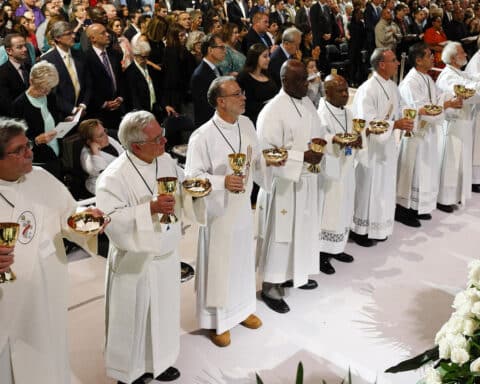“Co-responsibility,” a theme proposed for discussion at the Synod of Bishops on synodality, raises questions about the nature of the hierarchy — clergy who serve in the most visible structures of the Church — and what Pope Benedict XVI called the plebs sancta — that is, the “holy people,” who are members of the Body of Christ.
Twin errors lead to misunderstanding the Church today. Those who make one error mistakenly identify the Church as consisting simply of the hierarchy. Pope Benedict spoke of this temptation, cautioning, “There is still a tendency to identify the Church unilaterally with the hierarchy, forgetting the common responsibility, the common mission of the People of God, which, in Christ we all share.” Priests and bishops are not by virtue of ordination “more” of the Church than the laity, and we must eschew the temptation to see them as such.
When the Church is fundamentally understood in terms of the clerical state, Pope Francis has warned, there is a risk of clericalizing the laity, which has an extremely dangerous effect on the Church. In no uncertain terms, the pope warns: “The clericalized laity are a worse plague in the Church even than priests or bishops who have fallen into clericalism. Please, remember that laypersons are laypersons.”
The baptismal call to co-responsibility
If the first error is to identify the Church as synonymous with clerics, those who fall into the second forget the way baptism has transformed the life of each and every believer. “The tendency still persists to identify the People of God unilaterally,” says Pope Benedict, “in accordance with a merely sociological or political concept, forgetting the newness and specificity of that people, which becomes a people solely through communion with Christ.”
Co-responsibility, as articulated by Pope Benedict, recognizes a unique sphere of leadership in the mission of the Church, stemming from the baptismal call of the laity. This leadership is not independent of the ordained hierarchy but is rather their response to the call of their own baptism to share in the prophetic, royal and priestly vocation of proclaiming Christ’s message and building communion within the Church.
The priesthood exercised by clerics and the priesthood of the faithful are two different things. “Though they differ from one another in essence and not only in degree, the common priesthood of the faithful and the ministerial or hierarchical priesthood are nonetheless interrelated: each of them in its own special way is a participation in the one priesthood of Christ” (Lumen gentium, No. 10). Co-responsibility, rightly understood, recognizes the essential distinction between the hierarchy and the lay faithful. Ordained ministry is at the service of the holy people, the plebs sancta, while the lay faithful exercise their priesthood in proclaiming the Gospel and evangelizing. This co-responsibility is vital for the Church’s mission, and it respects the inherent distinctions and relationships within the body of Christ.
Not simply supporting actors
Ordained ministry has its own place in the Church, and clerics cannot simply be considered as members of the lay faithful without distinction. However, the laity are not merely cooperators with the clergy. Through baptism, the horizon of life of every Christian has been fundamentally, radically altered. The laity cannot be seen as passive recipients of religious instruction and sacraments, with the clergy holding the primary responsibility for the Church’s ministry and leadership. “They must no longer be viewed as ‘collaborators’ of the clergy but truly recognized as ‘co-responsible,’ for the Church’s being and action, thereby fostering the consolidation of a mature and committed laity,” says Pope Benedict. Laypeople are not merely supporting actors but essential partners in advancing the Church’s mission!
Co-responsibility respects the different vocations within the Church, thereby elevating authentic lay leadership. Wrongly understood, the concept of “synodality” could inadvertently dilute the richness of “co-responsibility.”
Misunderstandings about the nature of Holy Orders, reserved to men as instituted by Christ, threaten to clericalize the entire Church. Initiating the laity in participatory governance that does not belong to the lay vocation imperils the proper vocation of the laity. But the opposite error risks overshadowing co-responsibility and leading to a homogenized understanding of lay leadership. This flattening of roles could weaken the theological basis for recognizing the unique sphere of lay leadership, eroding its distinctiveness.
Co-responsibility acknowledges that the vocation of the clergy and the vocation of the laity differ not merely in degree but in essence. It simultaneously recognizes that all members of the Church play an essential part in its mission.
The upcoming Synod of Bishops on synodality presents an opportunity for the Church to carefully consider the relationship between “co-responsibility” and “synodality.” Safeguarding the authentic leadership roles of the laity and the ordained hierarchy within the framework of Eucharistic communion is essential.
While synodality should enhance collaboration and shared decision-making, it must not obscure the importance of co-responsibility rooted in the sacramental and theological foundations of the Church. Only by maintaining a harmonious balance between synodality and co-responsibility can the Church ensure that all its members, ordained and lay alike, contribute meaningfully to its mission of proclaiming the Gospel and building communion in Christ.

